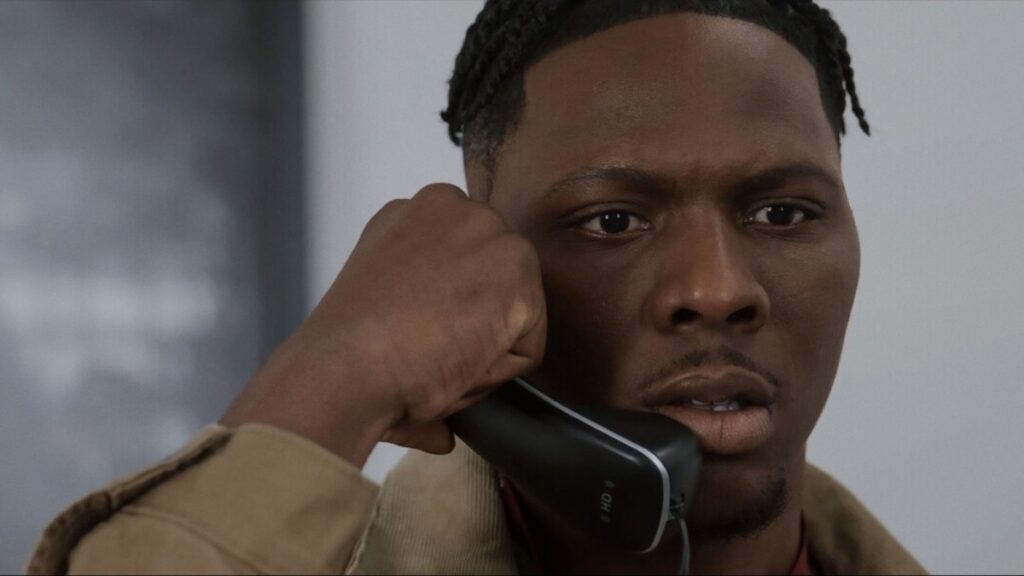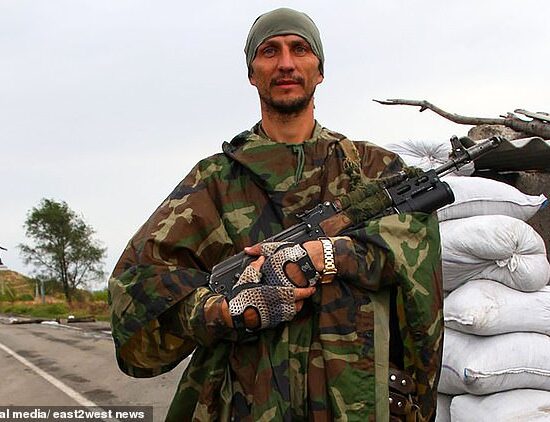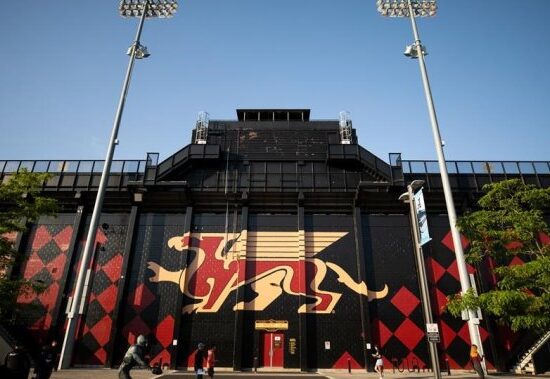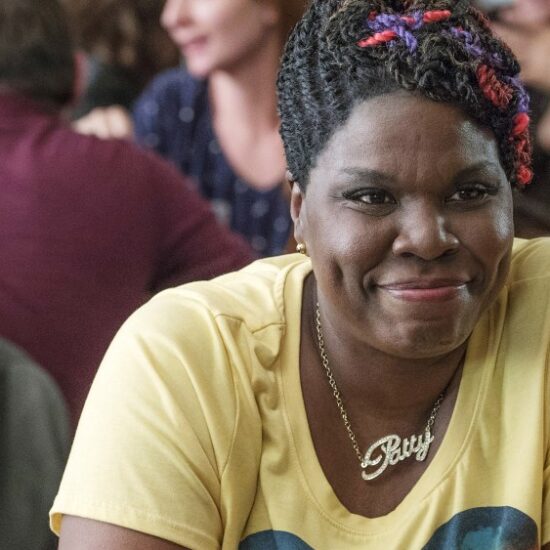
(Spoiler alert: The following article discusses the entirety of “All American: Homecoming” Season 2, Episode 5, titled “No More Drama.”)
“All American: Homecoming” creator Nkechi Okoro Carroll has never shied away from depicting the realities that come with the show’s setting at an HBCU, as well as its exploration of what it means to balance marginalized identities with college-specific struggles. These two strands are clearer than ever as they form the backbone of the two-part episodes “We Shall Not Be Moved” and “No More Drama,” which finds Bringston University reeling from a bomb threat and navigating the healing process that comes with being targeted at a space meant to be safe and empowering for Black students.
Co-showrunners and co-executive producers of The CW series, Carroll and Marqui Jackson, drew inspiration from and consulted with current HBCU students to accurately depict the realities of what took place at HBCUs beginning in January, where a series of coordinated threats were made in racist calls to schools like Howard University and Spelman College. While the FBI has stated it has nearly three dozen field offices on the case, no headway has been made in uncovering the origins or perpetrators of the attacks as of August.
“What were the conversations, and what were the discussions, so that we could get it right?” Jackson said of the research that went behind the crafting of the episodes. “It was a very heavy responsibility for all of us, top to bottom, to make sure that we portrayed these episodes in the most authentic light possible.”
Below, Carroll and Jackson go deep into the makings of the episodes, including the importance of destigmatizing Black mental health and depicting joy alongside trauma, as well as that budding romance between Simone (Geffri Hightower) and Lando (Martin Bobb-Semple).
TheWrap: These episodes touch on so many sociopolitical issues facing HBCUs while also showcasing Black joy and skewering that trope of just being strong and pushing through trauma. With bomb threats being a real issue at HBCUs and the FBI lagging on investigations, what made you want to portray this reality in a two-part episode?
NOC: We really pride ourselves on being an authentic depiction of what is happening specifically through the lens of Black youth, and I have a lot of family members, a lot of my friends who attended HBCUs. I was very disturbed by how little coverage the bomb scares at HBCUs were getting, and the reality of what that trauma of having to stand on a basketball court at 2 in the morning for four hours while they clear out your dorm and make sure there’s no threat, has a real impact on our youth. We just felt that we were in a very unique position with the show and this group of friends, to be able to shed light on it, but not just for dramatic TV purposes but more for: A. To raise awareness but to provide a blueprint for our youth, for the adults in their lives, for our communities on ways we can process Black trauma that allow for our community and our youth to heal.
MJ: Even after we started talking about the bomb scare or having a shelter-in-place episode, there was no version of Episode 4 without Episode 5 — you can’t do an event like this and show this kind of trauma without showing the way to release, and to use that opportunity to let people know that it’s OK to talk about the things that happened to you and that there’s breadth and space for all the different opinions. It was always going to be a version of the one-two punch.
One of the most joyous moments is the dodgeball scene, which sees Simone step up for her team and others in trying to help them get a release. Where did that idea come from, and how did you go about the idea that finding happiness in a terrible moment is a form of resilience?
MJ: The notion of Simone trying to do something to help her friends, that by nature, she’s a person that is a caretaker, and her realizing that talking about it wasn’t the way that this group was going to heal. In her thinking about ‘We need to not settle in the emotion of what had happened and engage and live life as if you know it’s not going to be.’ And to find this joy in a very childlike game just felt like the best way, the most cathartic way to deal with this environment. So to get them unified, to get everyone to laugh and into joy, as they’re still waiting to hear what’s going on. It made sense to us because Simone is intuitive to what these people need at that particular time. Thinking about her son, thinking about being away from him and their family, so it also helps her as a character to process the powerlessness of the moment.
NOC: As a mother of two teen Black boys, as we’re processing the trauma of things happening in the world, especially over the last couple years as it relates to Black men in America and I’m looking at my sons growing up, finding ways to, through the trauma, also give them joy, also being like, ‘You know what, we’re gonna get out of the house and we’re gonna throw a frisbee around the park and we’re gonna have a good time and we’re not gonna stop living.’ For me, during 9/11, when I was trapped underground with my colleagues, I think back on how scared and devastated and panicked we were but even in those hours of being down there, there were still moments of joy, of levity, of being able to relate on a human level that allowed someone to laugh or smile through the tears, and the dodgeball game is really just a manifestation of the need for that in the midst of everything else.

I wanted to ask about Cam, since these two episodes are so heavy for him, and I love that by the end he’s surrounded by his friends, who all go to trauma counseling. How did that storyline come about from beginning to end?
NOC: We’re presidents of the Mitchell Edwards fan club, card-carrying members, we have a uniform — he’s such a gifted, talented actor. We were so excited to give him this role, especially because we felt like processing it through Cam’s character, that he grew up with walls. As a Black man, you gotta fight your way through your pain and getting himself through the journey of realizing, ‘Oh, there is strength in healing as a group, there is strength in turning to my fellow neighbor and being like, ‘I need help.” There’s a lot of stigma around mental health, not just in the Black community. It’s so important, if we all just talked about it more openly, the hope is that people wouldn’t be so scared to ask for help.
I remember once, it was earlier last year, and someone said to me they were in a Black barber shop and they were listening to the patrons talking about the ‘All American’ universe. One of the things that one of the guys said apparently was like, ‘I love ‘All American,’ but Black men just aren’t that vulnerable, I just don’t know why the Black men on that show are so vulnerable.’ But he was like what do you think about that? Why do you write them so vulnerable, because in the community, they’re a little harder. But imagine what it would be like if they weren’t. We’re also writing towards what we can be, and not just what we see constantly. And when I said that they were like, ‘That is deep!’
I had a conversation with Mitchell about these two episodes. I told him, ‘Cam opening up is going to be the conduit to everyone else’s healing,’ that you don’t know what value you have to others by telling your story when you’re struggling. That was a big part of why it needed to be Cam, and why he needed to talk to his friends.
As we talked about, these episodes discuss everything from motherhood to mental health to police brutality, while also balancing the fact that these college kids want to live their lives and be with their friends and explore new romances. Was it challenging to navigate all of these topics in the hour-long format?
MJ: Yes, a very nice challenge to figure out how to weave all of these things together. As we were cracking the episode, we already had continuing storylines from the previous episode that we wanted to talk about: Damon dealing with his birth parents — OK, how does the bomb threat shift how he thinks and what he’s going to do in that moment, and it does. We went through with that lens of a bomb threat [being] an interruption — your life doesn’t just stop because of this big thing, the big thing affects your everyday life. And then also even in the midst of that, making sure that the bomb threat felt present, because we’re not a show where we’re going to see people searching buildings with no bomb. It was really doing the duality of ‘This is how I feel about the bomb threat and this is how it’s affecting the normal thing in my life that’s going on right now.’
I wanted to ask about the new relationship blossoming between Lando and Simone. What can they be to each other, and how might that affect their friend group when it’s revealed?
NOC: Listen, college is messy. [Laughs] You go through an experience like that, there’s a release, there’s a little bit of tomorrow [that] isn’t promised. Now, here’s the problem with that: What may start as a releasing of emotion, can very much get complicated and convoluted, and Simone is in a place where she’s really trying to uncomplicate her life. And so we’re gonna see them go on an interesting journey of a nontraditional start to what I think people were assuming would be this super important relationship, and for them, it’s really more a light, go-with-the-flow type thing, but what’s amazing and interesting and fun for us to work on is Lando has no stake in the game in terms of the friend group. He’s a man of the campus, he speaks his mind, he’s got his own life going on. He’s a little bit more emotionally mature than a lot of our friend group and he’s definitely caught up in the same drama with them since day one of freshman year. And so that outside perspective and his ability to hold a mirror up to Simone without wanting anything from her other than for her to be her best self is a dynamic that she’s not used to. Her most serious relationship, which was Jordan, started off with an unexpected pregnancy, her not being fully truthful about it and Jordan turning into this amazing thing. It was like her first true love. And then the attraction with Damon and the feelings there — it’s all been complicated. And finally, there’s something that kind of isn’t, and she enjoys that and also wants to keep it for herself. We’re gonna see the fun dynamics of that play out over the next few episodes.

Because of the specificity of these real-life plotlines, did the show consult with any mental health experts or HBCU leaders?
MJ: We do have HBCU alums on our staff, so they were able to help us with their experience and able to help us tap into students that are on HBCU campuses right now. A lot of that back and forth, that competition on the tennis court — a lot of that language came from perspectives and things we’ve heard from actual students that are currently students of HBCUs right now. Going to social media and scrolling back and looking at, what are the students saying, back in January and February, when these things were going on and trying to get our finger on the pulse of what was it like to go through this in real time? What were the conversations, and what were the discussions, so that we could get it right? It was a very heavy responsibility for all of us, top to bottom, to make sure that we portrayed these episodes in the most authentic light possible.
This interview has been edited and condensed for concision and clarity.

















